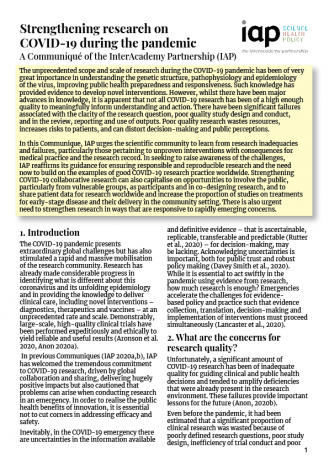The unprecedented scope and scale of research during the COVID-19 pandemic has been of very great importance in understanding the genetic structure, pathophysiology and epidemiology of the virus, improving public health preparedness and responsiveness. Such knowledge has provided evidence to develop novel interventions. However, whilst there have been major advances in knowledge, it is apparent that not all COVID-19 research has been of a high enough quality to meaningfully inform understanding and action. There have been significant failures associated with the clarity of the research question, poor quality study design and conduct, and in the review, reporting and use of outputs. Poor quality research wastes resources, increases risks to patients, and can distort decision-making and public perceptions.
In this Communiqué, IAP urges the scientific community to learn from research inadequacies and failures, particularly those pertaining to unproven interventions with consequences for medical practice and the research record. In seeking to raise awareness of the challenges,IAP reaffirms its guidance for ensuring responsible and reproducible research and the need now to build on the examples of good COVID-19 research practice worldwide. Strengthening COVID-19 collaborative research can also capitalise on opportunities to involve the public, particularly from vulnerable groups, as participants and in co-designing research, and to share patient data for research worldwide and increase the proportion of studies on treatments for early-stage disease and their delivery in the community setting. There is also urgent need to strengthen research in ways that are responsive to rapidly emerging concerns.
Read the press release here, or download the Spanish version of the communiqué here.

